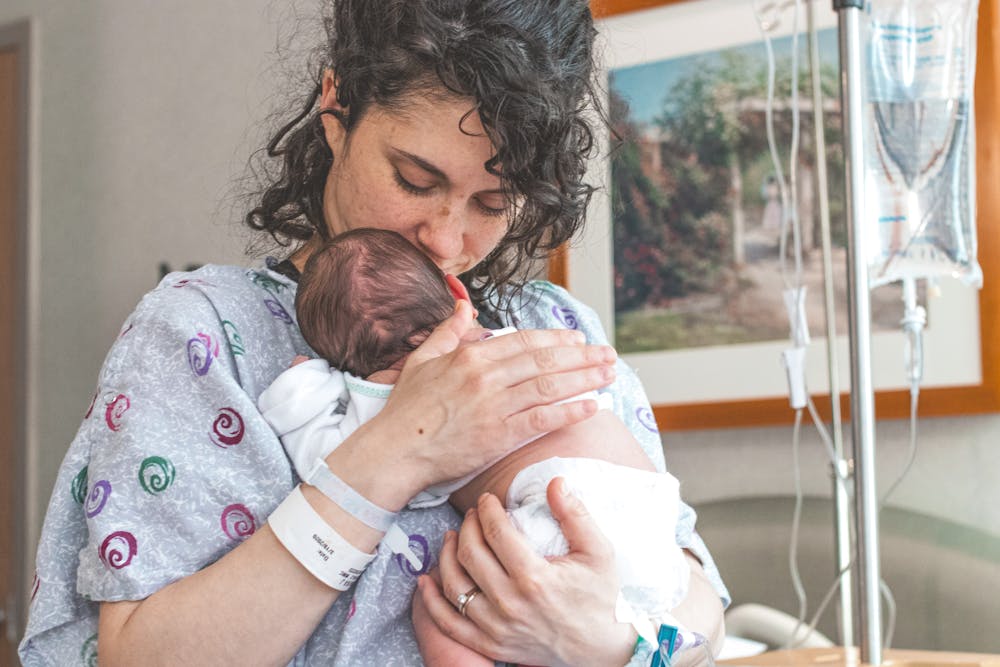The process of bringing a newborn in to your home can be a beautiful time in your life but it also has its share of challenges.The Ultimate Guide to Newborn Baby Care Every detail matters during a newborn’s first days — from how they are fed to keeping them clean. Here’s everything you need to know to make sure your baby is safe, comfortable and healthy at home.The Ultimate Guide to Newborn Baby Care.
12 Ways to Prep Your Home for a Newborn

Setting up a healthy environment for your baby to come home to is paramount before this. Here’s what you need:
Diapers, baby wipes, swaddle blankets, baby clothes, and everything you need for feeding.
Sleeping: A firm crib or bassinet mattress with fitted sheets is best for safe sleep.
Baby-Proof: Cover sharp edges, put safety locks on cabinets and remove anything small enough for a baby to swallow.
Feeding Your Newborn
Adequate nutrition plays an essential role in a baby’s development.
Breastfeeding Tips:The Ultimate Guide to Newborn Baby Care
♥ Make sure baby is latching correctly, so you avoid discomfort.
♥ Feed 2-3 hourly or on demand.
♥ Drink lots of water and eat well to produce more milk.
Invest in a quality infant formula as per your pediatrician’s recommendation.
♥ Use boiled water to prepare the formula and sterilize bottles.
♥ Always check the temperature prior to feeding.
♥ Newborn Sleep Patterns
The typical newborn will sleep about 14-17 hours a day but irregularly.
Establishing a routine: Helping your baby sleep on a regular schedule
Safe Sleep: Put your baby down on their back to sleep, and keep loose bedding away.
The Sleep Cues: Be aware of signs like yawning or rubbing of the eyes to prevent overtiredness.
Diapering and Hygiene
Ensuring your baby stays clean is important to avoiding infection and diaper rashes.
Diaper Changing Tips:
♥ Keep changing the diapers intermittently every 2-3 hours and as soon as it’s wet or soiled.
♥ Use unscented wipes, and diaper cream/protectant to avoid rashes.
♥ Wash hands before and after the diaper change.
Bathing Your Newborn:
♥ For bathing your baby you could do this using lukewarm waters 2-3 times in a week.
♥ To protect their delicate skin, use a gentle, fragrance-free soap.
♥ Always support your baby well and steer clear of deep water.
Baby Health and Immunization
Common Health Concerns:
♥ Jaundice: Yellowing of the skin, very normal in newborns but should be watched.
♥ Colic: Cryptic crying spells; calming methods involve swaying and light rubbing.
♥ Umbilical Cord Care: Keep it dry and clean, falls off 1-2 weeks.
Vaccination Schedule:The Ultimate Guide to Newborn Baby Care
Check your pediatrician’s recommended immunization schedule to keep track of timely vaccinations.
Bonding and Development
Getting to know your baby builds emotional safety and mental growth.
♥ Body Contact: Balances temperature body and bonding.The Ultimate Guide to Newborn Baby Care
♥ Talking and Singing: Assists with critical early speech recognition and emotional bonding.The Ultimate Guide to Newborn Baby Care
♥ Tummy Time: Helps strengthen the neck and shoulders to support motor development.
Baby Safety at Home
General Safety Measures:
♥ Never leave your baby alone on high surfaces.
♥ Do not keep hot liquids and sharp objects within your child’s reach.
♥ Have room temperature be appropriate (68-72°F).
Emergency Preparedness:
♥ Take a CPR and basic first aid course for infants.
♥ Keep emergency numbers readily available, including your pediatrician contact.
Managing Parental Stress
Newborn care can feel impossible. Self-care is of utmost importance.
♥ Accept Help: Let friends and family help clean your house.
♥ Catch Some Zs Whenever You Can: Sleep when the baby sleeps to prevent sleep deprivation.
♥ Get Support: Joining parenting groups can provide support and guide you through ideations.
FAQs on Newborn Baby Care
How often do I feed my newborn?
We want newborns to be fed every 2–3 hours, both breastfed and formula-fed.
When can I begin tummy time with my baby?
You can begin tummy time as early as day one, for a few minutes each day, with supervision.
How do I know if my baby’s getting enough?
Signs that she is eating well include steady weight gain, at least 6–8 wet diapers per day, and an overall contented demeanor after feeding.The Ultimate Guide to Newborn Baby Care
When should I contact the doctor?
Consult a pediatrician immediately if your baby has a fever higher than 100.4°F, refuses to feed, has signs of dehydration and excessive crying.The Ultimate Guide to Newborn Baby Care
More Advice and Thoughts for New Parents
The adventure of first-time parenthood is full of joy — and some surprises along the way. While the basics of caring for a newborn have been discussed, it is equally as important to explore more subtle areas that will help build confidence and create a nurturing environment for baby and parents alike.The Ultimate Guide to Newborn Baby Care
Getting to Know Your Infant’s Cues and Behavior
Every baby communicates in their own way, and as a new parent, decoding some of these signals can make daily routines easier. Some common cues include:The Ultimate Guide to Newborn Baby Care
Hunger or fatigue:
In the case of a hungry baby it may cry because it is hungry or it may be tired. Instead, watch for subtle cues like smacking lips, sucking motions or eye rubbing. Locating these early signals helps you respond in time and reduce fussing.
Conclusion
Home care of newborn babies requires love, patience, and sharp eye. Adhering to these tips can help parents create a safe, nurturing milieu promoting their baby’s growth and well-being. Always be informed, follow your gut, and embrace this wonderful journey of parenthood!
With these complete tips on newborn care, new parents can now properly handle the journey of the first few days of life and give their child a healthy, long and happy life.











